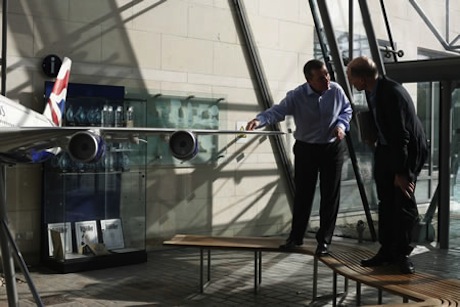A Week at the Airport
Extract
From the outset, my employer had suggested that I might wish to conduct a brief interview with one of the most powerful men in the terminal: the head of British Airways, Willie Walsh. It was a daunting prospect, as Walsh was having a busy time of it. His company was losing an average of £1.6 million a day, a total of £148 million over the previous three months. His pilots and cabin crew were planning strikes. Studies showed that his baggage handlers misappropriated more luggage than their counterparts at any other European airline. The government wanted to tax his fuel. Environmental activists had been chaining themselves to his fences. He had infuriated those in the upper echelons at Boeing by telling them that he would not be able to keep up with the prepayment schedule he had committed to for the new 787 aircraft he had ordered. His efforts to merge his airline with Qantas and Iberia had stalled. He had done away with the free chocolates handed round after every meal in business class, and in the process provoked a three-day furore in the British press.

Journalism has long been enamoured of the idea of the interview, beneath which lies a fantasy about access: a remote figure, beyond the reach of the ordinary public and otherwise occupied with running the world, opens up and reveals his or her innermost self to a correspondent. With admission set at the price of a newspaper, the audience is invited to forget their lower station in life and accompany the interviewer into the palace or the executive suite. The guards lay down their weapons, the secretaries wave the visitors through. Now we are in the inner sanctum. While waiting, we have a look around. We learn that the president likes to keep a bowl of peppermints on his desk, or that the leading actress has been reading Dickens.
But the tantalising promise of shared secrets is rarely fulfilled as we might wish, for it is almost never in the interests of a prominent figure to become intimate with a member of the press. He has better people onto whom to unburden himself. He does not need a new friend. He is not going to disclose his plots for vengeance or his fears about his professional future. For the celebrity, the interview is thus generally reduced to an exercise in saying as little as possible without confounding the self-love of the journalist on the sofa, who might become dangerous if rendered too starkly aware of the futility of his mission. In a bid to appease the underlying demand for closeness, the subject may let it drop that he is about to go on holiday to Florida, or that his daughter is learning how to play tennis.
There was evidently nothing of standard consequence that I could ask Mr Walsh. There was no point in my bringing up pensions, carbon emissions, premium yields or even the much-missed chocolates – no point, really, in our meeting at all, had not events reached the stage where articulating this insight would have seemed rude.
So we got together for forty minutes in a conference room, between Mr Walsh’s meeting with a trade-union representative and a delegation from Airbus. I felt as if I were interrupting a discussion of beachheads between Roosevelt and Churchill in May of 1943.
Fortunately, I had come to the conclusion that though Mr Walsh was the CEO of one of the world’s largest airlines, it would be wholly unfair of me to treat him like a businessman. The fiscal state of his company was simply too precarious, and too woefully inaccurate a reflection of his talents and interests, to permit me to confuse Mr Walsh with his balance sheet.